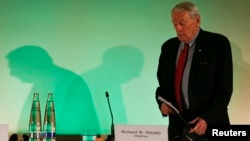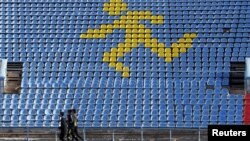Senior figures at the International Association of Athletics Federations (IAAF) must have been aware of the full extent of doping in track and field and were themselves steeped in corruption, according to a report by the World Anti-Doping Agency.
The 89-page report released Thursday details "embedded corruption" within the IAAF.
It accused top officials running the sport of track and field of blackmailing athletes who doped and failing to discipline them in a timely manner.
Ex-IAAF president Lamine Diack, himself wanted by Interpol, organized "conspiracy and corruption" at the heart of the federation and sanctioned fraud and extortion of athletes, independent investigator Richard Pound said in the report.
The investigation also raised uncomfortable questions about the sport’s current leader, Sebastian Coe, a two-time Olympic gold medalist who was in charge of the 2012 Summer Olympics in London.
Coe succeeded Diack as IAAF president in August, after eight years as a vice president. But Pound expressed confidence in Coe's ability to conduct the necessary reforms at the IAAF.
"There is an enormous amount of reputational recovery, and I can think of no one better than Lord Coe to lead that," he told a news conference near Munich.
Coe was in the audience when Pound presented his findings.
Rapidly growing scandal
The report added to a rapidly growing scandal involving organized doping and its concealment that has rocked world athletics and drawn comparison with a corruption scandal at the global soccer federation, FIFA.
Pound's first report, issued in November, detailed a state-sponsored doping program in Russia involving corruption and cover-ups. That led the IAAF to suspend Russia's track and field federation, leaving its athletes in danger of missing this year's Olympics in Rio de Janeiro.
The IAAF's own Ethics Commission subsequently banned former IAAF anti-doping chief Gabriel Dolle, two top Russian athletics officials and Diack's son, Papa Massata Diack, for covering up Russian distance runner Lilya Shobukhova's positive dope test and for blackmailing her over it.
IAAF leaders must have been aware of the full extent of doping in Russia, but did nothing to stop it, the new report said.
"It is not credible that elected officials were unaware of the situation affecting... athletics in Russia. If, therefore, the circle of knowledge was so extensive why was nothing done? Quite obviously there was no appetite on the part of the IAAF to challenge Russia,'' Pound said.
His report also details the personal relationship that developed between Diack and Russian President Vladimir Putin.






